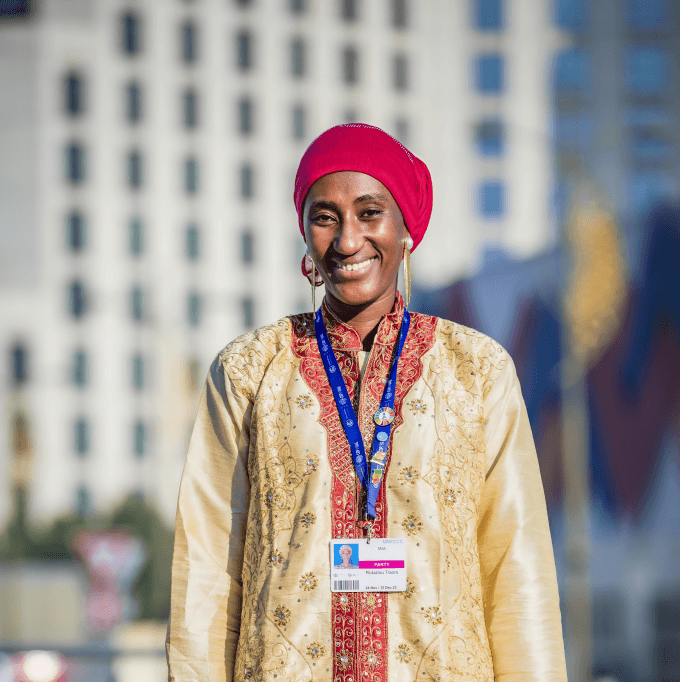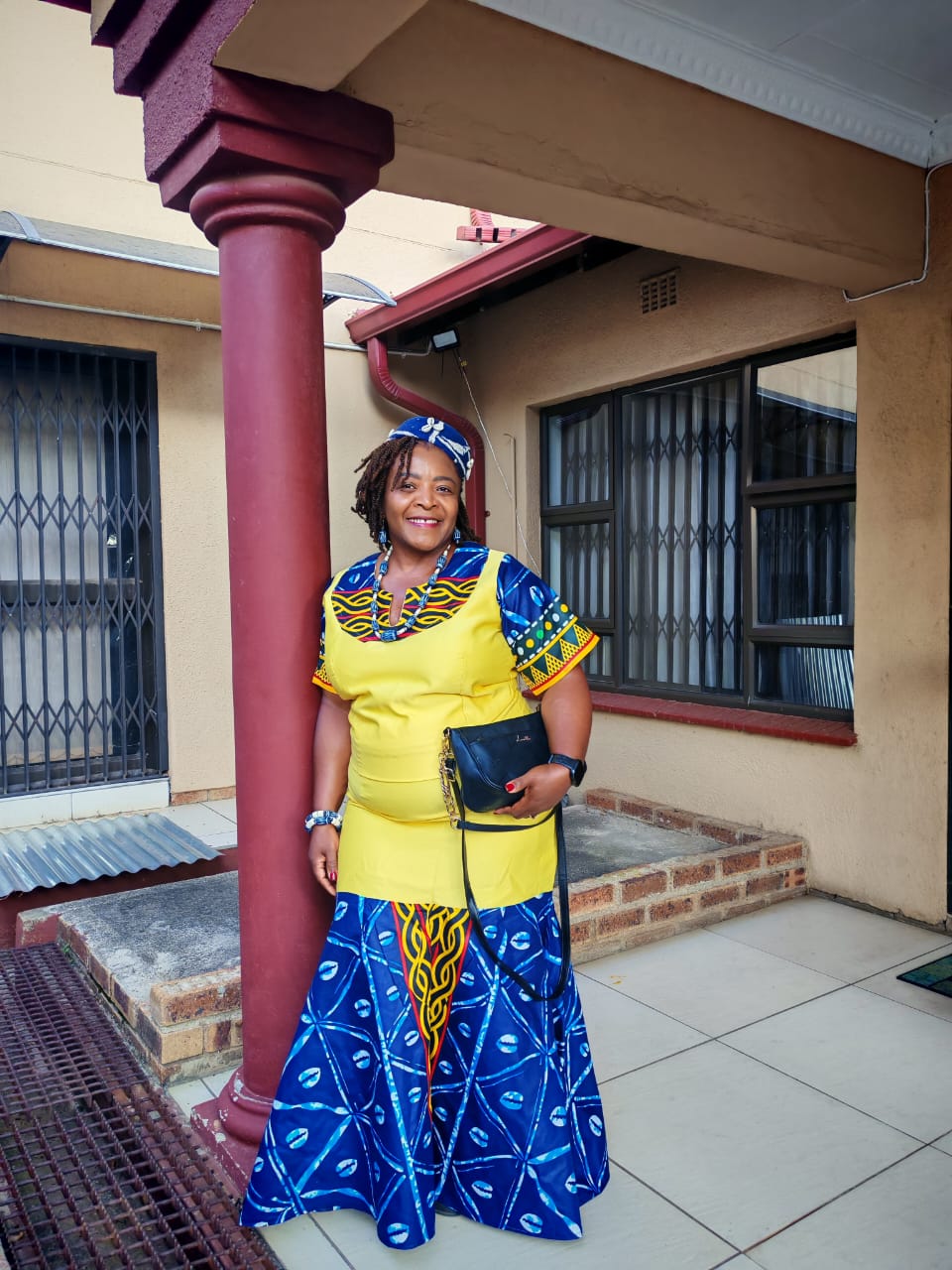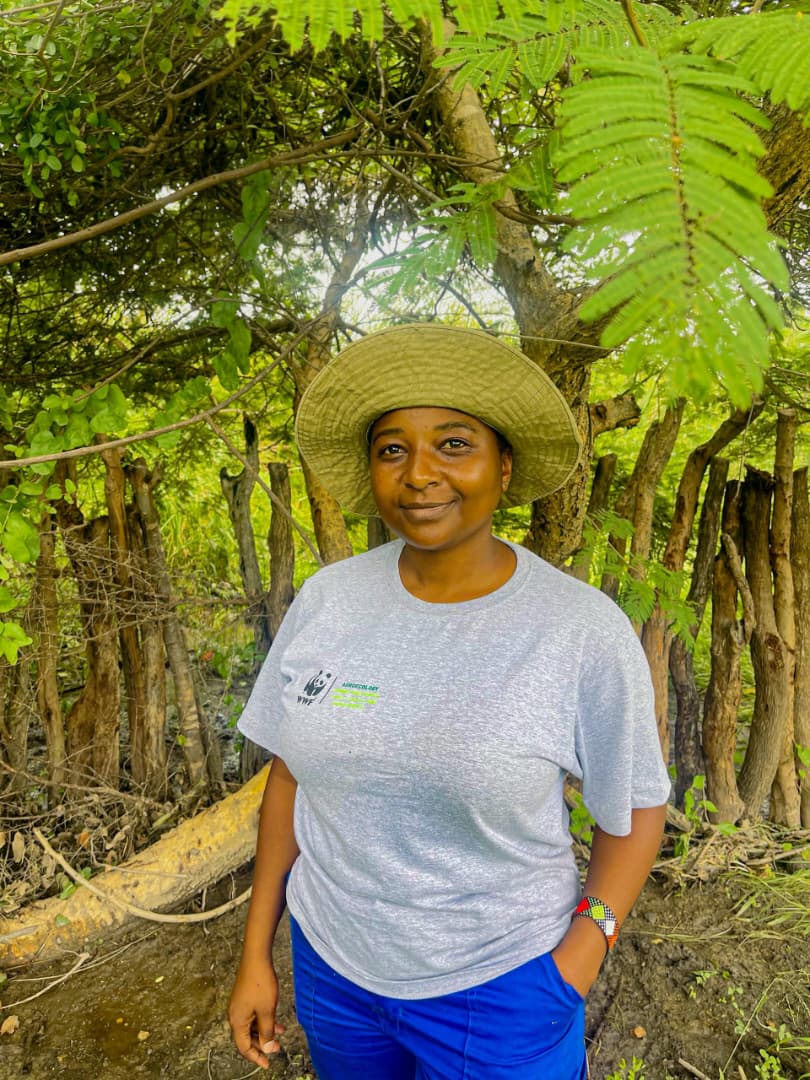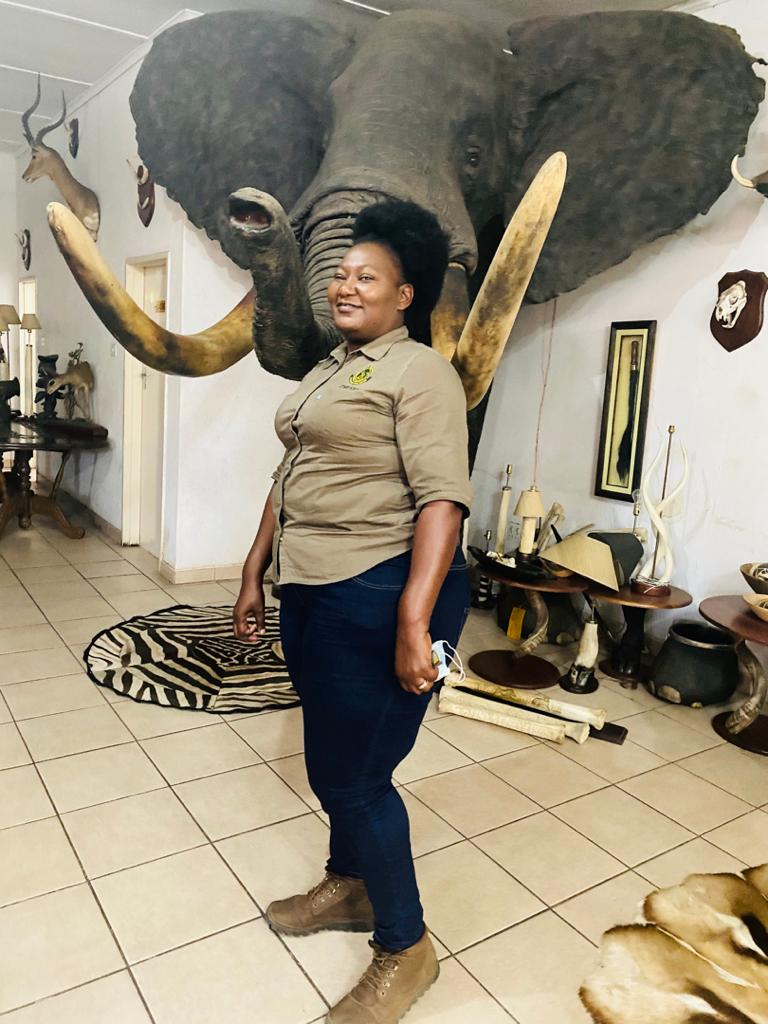This interview is part of a series profiling the stories of the 2024 WE Africa leadership programme fellows, African women in the environmental conservation sector who are showing up with a strong back, soft front, and wild heart.
***
It’s 2019. Rokiatou Traoré and her husband are fired up. After 11 years of living and working in Europe, they’re heading back home to Mali to build a business that is founded in the triple bottom line—people, planet and profit.

Neither is an environmentalist. He’s a statistician. She’s a business strategist.
Rokiatou heads to Bamako to get things started. Meanwhile, her husband lands a major promotion: special advisor to the President of Togo. Two countries apart, but still building together. They speak on the phone every day.
Fast forward to 2020. They have recruited 60 women to plant 5,000 Moringa seedlings. The pilot project is ready to launch.
But Rokiatou’s husband is in the hospital with a minor leg injury. Nothing serious.
On the night of the event, they talk on WhatsApp, as always. Rokiatou tells her husband how exhausted she is from the planting. He listens. Encourages her. Everything feels normal.
Then, at 3 am, her phone rings. It’s her sister-in-law. Rokiatou silences it—she’ll call back later. When she wakes up for morning prayers at 5 am, she returns the call.
“Your husband is no more,” her sister-in-law says.
Rokiatou is frozen. “Put someone else on the phone,” she says. “What you’re saying makes no sense. We just spoke.”
But it’s real. Her husband, lover, child’s father, best friend and business partner is gone.
Three months later, Rokiatou discovers she’s pregnant with their second child. Grief swallows everything. There’s no one to lead, no one to pay the women who are planting. They abandon the work. 80% of the seedlings die.
***
“It was the most difficult period of my life,” Rokiatou says.
“He was my person. My soul mate. We’d been together since university. We made every decision together—even before we got married. There was something between us that you don’t often see. What we had was very, very special.
“So when he passed, I was completely lost. I was crying every day".
Later, Rokiatou made her husband a promise. “I will take care of the kids”, she said. "I will take care of the company. I am going to realise everything that we’ve planned together.”
***
After registering her company, Herou Alliance, Rokiatou started training herself on agroforestry and applying for funding opportunities. The first that came in was from the Tony Elumelu Foundation. It helped her source Moringa leaves, which she then processed to create Moringa powder and tea. Her first testers were her family and friends.
“They were brutally honest,” she says. “But it helped. We adjusted and made it better.”
Next, she pitched to supermarkets. Most turned her down. ShopRite in Mali didn’t. They placed an initial order of 10 boxes of Moringa tea and powder. Within a few weeks, they were sold out. Then came the second order. Ten more boxes. Gone within a week. By the end of that first year, three supermarkets were carrying her products.
Then came the Dakar International Fair. Rokiatou and her team brought every product in their arsenal and sold every last one. It was a huge moment.
“We were just three people. Me, two others, and my family that jumped in to help. We showed up like a real team.”
Emboldened, she sought out partners and, in 2021, found a global NGO working with farmers in Bamako. She pitched to them hard, and they agreed to run a pilot: 1,000 farmers planting 20,000 Moringa trees. By the end of that year, they were buying leaves from those farmers. With a more extensive supplier base, they expanded their product line to include Moringa powder, spices, oil and soap. Soon, they had a variety of products available in supermarkets and fairs.
That same year, Rokiatou was one of the 700 selected from Sub-Saharan Africa to join the Mandela Washington Fellowship.
“I was lucky,” she says. “But I was ready, too.”
Then, she scored another rare spot as one of 100 chosen for a professional internship where she worked on a regenerative farm in South and North Carolina.

“I learned so much. It gave me new energy and ambition.”
She came back to Mali hungry. Her first stop was the same NGO with which the pilot had succeeded. She proposed a much bigger project: 5,000 farmers planting 100,000 Moringa trees. They said yes.
Meanwhile, her supermarket network had exploded. Ten stores were now stocking her products. Her ever-expanding team was everywhere: Senegal, Côte d’Ivoire, Burkina Faso. They even started planting reps in those countries to keep sales alive year-round.
Then came 2023, and the storm hit. They had prepped 150,000 seedlings for a massive tree-planting project. The plants were ready by August, but the NGO pushed the pick-up to September.
Big mistake.
Armyworms invaded and ravaged the entire stock. Out of 150,000 trees, less than 5,000 survived. It was devastating.
“I watched grown men on my team cry,” she says.
Though she was shattered inside, Rokiatou didn’t have the luxury to fall apart. Not publicly.
“I had to be the one to believe and keep their hope alive,” she says. “Even though I was breaking inside, I couldn’t show it.”
The team, she says, came out stronger.
By 2024, they found a new NGO working with shea farmers and looking to diversify into Moringa. Another pilot, this time for 50,000 trees and 500 new farmers. Smooth execution. Huge success. That same year, they secured their first major loan. The money helped them buy machinery and upgrade their entire packaging line.
It was a full-on comeback, but Rokiatou was just getting warmed up.
“The plan is to plant 10 million trees,” she says.
***
Why Moringa? I ask.
“I discovered it in Turkey; it was simple Moringa tea. I got curious so, I started researching and found that it really is a miracle tree. It can help lower high blood pressure, cholesterol and blood sugar levels. It also cleanses and boosts the immune system by removing toxins. It’s rich in calcium, protein, iron, and vitamins A and C. And there’s growing research showing it may even help fight cancer by reducing the growth of cancerous cells.
“And it’s not just for people. Moringa can be added to animal feed for cows, chickens and goats to improve their health.”
In those initial stages, Rokiatou and her husband knew that back home, Moringa could be found in everyone’s backyard. But nobody was using it. It was just a normal tree for them.
That was the first opportunity.
The second was that Moringa is evergreen. It grows in the Sahel. That means it survives in some of the harshest, driest regions. And in a place where water is a huge challenge, where desertification and deforestation are a real threat, planting trees is a no-brainer. If the people see value in it, they’ll plant it. And the more they plant, the more they push back against these threats.
The third reason was the versatility. The leaves, the seeds, the flowers—everything is edible, valuable. You can process them into powders, oils, teas, skincare products...It’s an ecosystem of endless possibilities.
She also saw the potential impact.
“We could create income for women—train them to grow Moringa and buy their leaves, seeds and flowers,” she says.
***
Rokiatou describes herself as an entrepreneur who cares deeply about the environment. “For me, this is conscious business, and from the very beginning, we believed it could sustain itself,” she explains.
And it has.
“Of course, we need funding to scale but we believe in the power of the product. We believe in partnership. We’ve even taken out loans because we know we can repay them. That’s how much confidence we have in this model.”
She sees no contradiction between profit and impact. In fact, to her, they are deeply connected. “Someone is selling the seedling; someone is buying it. We’re creating economic opportunities and that’s impact,” she says.
NGOs also purchase seedlings from them to distribute to farmers, who then sell their products back to Herou Alliance. It’s a win-win all round.
***
Rokiatou admits there are moments when the weight of it all feels too much. “Sometimes I catch myself wondering, why am I struggling so hard? Why not just find a good job and settle?”

But even when doubt creeps in, her vision remains intact. “It’s like my mind won’t let me forget,” she says. “If I don’t do it, who will collaborate with the women? Who will plant the 10 million trees we’ve committed to?”
That clarity and sense of responsibility always bring her back.
“I’ve always believed that where there’s a problem, there’s a solution. Maybe not right away. But it’s there. That is what keeps me moving.”
The downside to her relentless drive was something she hadn’t noticed—until it was reflected in her coaching sessions in the WE Africa program.
“I thought I had healed,” she admits. “I was carrying on with my activities, working until 3 am and waking up at 7 am. I thought that was strength.”
But as her coaching sessions unfolded, a different truth began to surface. “It hit me that I hadn’t really mourned my husband. I’d been hiding from the pain, burying it under work.”
Feeling her emotions, she says, wasn’t how she was wired to survive.
“But with WE Africa, I finally gave myself the space to feel it all. And now, I can honestly say I am healed,” she says.
***
Rokiatou’s vision is as bold as the Sahel is vast. She wants to turn the entire region—not just Mali—into an oasis.
“I dream of a Sahel where trees cover the land. Where people live with the trees—planting them, eating from them, earning from them, healing through them. I want to see tree-based products on every table in Africa, America, and Europe.
That’s the dream.
And she’s not doing it alone. Her team has grown to eight core members working daily on the project. Eight more work in the processing unit, and seasonally, there is a planting team of 30 people.
What drives her is a visceral sense of urgency. Having watched her husband die at 32 years of age, she is determined to really live and make an impact with the life she’s been given. “I didn’t know I could be this fearless,” she says. “I always think—maybe I could die tomorrow. So, before that happens, let me try. If it works, it works. If not, at least I tried.”





